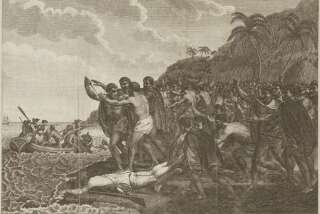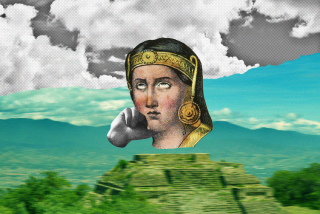UCLA Embarks on a Rediscovery of Columbus
- Share via
Hello, Columbus.
Again.
Surprise, everybody. The 500th anniversary of the discovery of America is only five years away. All things considered, it’s not a minute too early to begin working on celebrating--and pondering--the landfall of an Italian-born, Spanish-financed voyager who went looking for Asia and found an inconvenient continent blocking the way.
The Making of an Event
At least this is the opinion of UCLA’s Fredi Chiappelli, who recently took up duties as special adviser to the chancellor on the university’s quincentennial observances.
So while the rest of the nation slouches through this bicentennial year of the U.S. Constitution, Chiappelli, director of UCLA’s Center for Medieval and Renaissance Studies, is looking forward--and backward--while he plans to mark an event that made the founding of this country possible.
“When I started talking about 1992, some people asked me, ‘What is 1992?’ ” Chiappelli said. “They needed a moment to focus that it is in fact a half-millennium of America.”
Chiappelli’s new position is icing on the cake to a project that’s already well under way. The center is sponsoring and coordinating a scholarly project called The Repertorium Columbianum--a massive compilation and translation of documents related to Columbus, including his complete writings, and his 1492 discovery.
Despite universal renown, Columbus remains an obscure figure in many respects, Chiappelli said, noting that the former pirate used the Bible and the Apocrypha as mystical guides to navigation and discovery. This Italian who always wrote in Spanish or Latin may even have had hints that islands lay to the west of the Iberian Peninsula --probably from uprooted trees and other drifting plant debris sighted on his voyages to West Africa, he said.
Most of the materials to be translated are from European libraries and archives in Seville, Genoa and Venice, the principal repositories of governmental, biographical and cultural papers related to early contact with the New World. Papers from Madrid, Paris and Rome also will figure prominently. Translators will work mainly with photostats of originals but Chiappelli stressed that all translations will be checked against the original papers by experts. On this continent, collections of early Americana at the John Carter Brown Library in Providence, R.I., will be used for reference and translation, Chiappelli said.
The 12-volume project will include the first translation into English of many 15th- and 16th-Century Spanish-, Italian- and Latin-language narratives, testimonials, navigation logs, letters and other documents about Columbus, Chiappelli said. Beyond Columbus, the repertorium will contain materials up to the conquest of the Aztecs of Mexico, thus spanning the early phases of colony founding as well as exploration.
Just as important, Chiappelli said, is the fact that all of the “rich, problematic mine of information” will be indexed, so that all references to such subjects as canoes and cannibals, tobacco and gold will be available to readers and scholars. Ideally, Chiappelli, himself a native of Italy, would like a computer disk of the index to be included with each volume.
Translation and editing responsibilities have been farmed out to eight other universities and historical study centers across the country. The first available volume, actually Volume 7 in the series, will be completed in 1989. It will contain about 80 items--most never translated into English--on the Italian role in Columbus’ voyages. All volumes, to be completed by 1992, will contain original text and translation on facing pages.
If all goes well, Chiappelli said the project with its fresh, thoroughly researched translations and index should stand as a definitive work until the discovery’s next celebration in 2092.
Although Chiappelli isn’t sure how much the job will eventually cost, support has already come from the National Endowment for the Humanities and the Italian commission for the quincentennial, which has pledged 100 million lira--about $75,000--for each of the next five years. The Repertorium Columbianum also has been endorsed by the United States’ Presidential Quincentenary Jubilee Commission, which includes such well-known scholars as the University of Chicago’s William H. McNeill.
Celebrations of Columbus’ epic voyage will be transatlantic in scope, Chiappelli said, with observances in Europe, Latin America and North America. Spain, for instance, has adopted the slogan “500 Years, 500 Projects” to signal its ambitions, he said.
Vikings and Others
This outpouring of remembrance, Chiappelli said, recognizes that although the Vikings and possibly others reached America first, Columbus’ landing was by far the most important because it established permanent contact between Europe and America and began a new age.
Chiappelli hopes that all these events and projects will be done with a fresh eye for historical truth.
“I think that we have to underline that we are not going to talk again about colonization (of the New World),” he said. “We are going to talk about contribution, about encounter. The meeting of two civilizations may have been bloody for some time but the important thing that the Europeans found on this continent was not gold, was not silver, was not even oil. It was man, people. The old European civilization was fertilized by the discovery. And the New World became, not a combination of the old and new worlds, but something new for everybody.”
In a position paper outlining the translation project, Chiappelli stressed this point even more firmly: “The study of the contact between two worlds must go beyond the facts of the famous voyage and the idealizations inherited from the 19th Century, especially those informed by ideological stereotypes about the inevitable ascendancy and irresistible progress of European society.”
To Chiappelli the anniversary is an opportunity for better-informed contemplation of an almost cosmic event.
The discovery “encompasses zoology and architecture, ship technology and a way of considering what is man and what he isn’t. . . . It’s elemental and essential somehow. And the panorama is as large as the continent,” he said.
More to Read
Sign up for Essential California
The most important California stories and recommendations in your inbox every morning.
You may occasionally receive promotional content from the Los Angeles Times.










